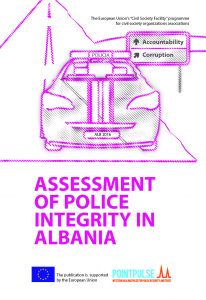2016 ASSESMENT OF POLICE INTEGRITY IN ALBANIA
2016 ASSESMENT OF POLICE INTEGRITY IN ALBANIA
Author(s): Besjana Kuci, Eranda Begaj
Subject(s): Politics / Political Sciences, Politics, Governance, Security and defense, Corruption - Transparency - Anti-Corruption
Published by: BCBP Beogradski centar za bezbednosnu politiku
Keywords: police integrity; Albania; police sector; corruption
Summary/Abstract: The adoption of the judicial reform package in July 2016 has been marked as the first concrete step in strengthening the rule of law and progress towards the European pathway. It goes without saying that the judicial reform is considered a panacea in the fight against corruption at all levels. Yet, in Albania, experience has proved that the enactment of legislation does not always match its implementation and that political will does not always coincide with genuine commitment to overcome the status quo. Hence, the focus on the judicial reform has virtually eclipsed police integrity concerns. Corruption is still largely widespread in many areas despite the anti-corruption measures in place. In this regard, this report aims to assess police integrity and examine its compliance with the principles of good governance and accountability. During this year police integrity has been compromised by problems of bribery and misuse of office, excessive use of force, passive professional behaviour and allegations of links to drug trafficking. Therefore, police integrity must become one of the priority areas of further strategic development of this service. There is a complex system of internal and external controls of the State Police (SP) in place, but it is characterised by insufficient cooperation and information exchange between the authorities in charge of oversight as well as insufficient implementation of their conclusions and recommendations. Moreover, the citizens tend to be confused about the proper channels and authorities to whom to report corruption or misconduct, as a consequence of presence of too many actors. Although some progress has been achieved, mainly with regard to the adoption of the legal framework on anti-corruption, oversight authorities have not yet achieved necessary efficiency in the implementation of their powers. The Law on SP of 2014 has been followed by the endorsement of a legislative package including the new State Police Regulation (2015), the Strategy on Public Order 2015- 2020 and its Action Plan 2015-2017 that lay down statutory gurantees concerning the prevention of corruption within the State Police. Moreover, the Law on Internal Affairs and Complaints Service, enacted in 2014, repealed the former Law on Internal Control Service. This Law had provided explicit provisions with regard to the fight against corruption in the police.
Series: BCBP - Assessment of Police Integrity
- Page Count: 59
- Publication Year: 2016
- Language: English
- Content File-PDF

